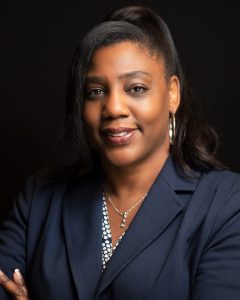By Adelle Schubarg, Environmental Research Assistant
 Josie Williams is the Executive Director of the Greensboro Housing Coalition (GHC), a nonprofit advocacy and referral agency that works to provide safe, healthy, and affordable housing for the Greensboro area. GHC has four primary departments: Homeless Prevention, Foreclosure Prevention, Healthy Homes, and Community Engagement.
Josie Williams is the Executive Director of the Greensboro Housing Coalition (GHC), a nonprofit advocacy and referral agency that works to provide safe, healthy, and affordable housing for the Greensboro area. GHC has four primary departments: Homeless Prevention, Foreclosure Prevention, Healthy Homes, and Community Engagement.
As Executive Director, Josie leads the agency and guides the decisions, programming, and public presence of the organization. Core to her work is advocating for collaborative, community-centered strategies.
GHC is a member of the Collaborative Cottage Grove partnership, a multi sector cooperation aimed at fostering sustainable, healthy communities. It was through this alliance that Josie got connected with the NC Lead and Healthy Homes Outreach Task Force. This connection has allowed her to form relationships with local organizations, working towards collaborative solutions to today’s housing issues.
Josie says the most rewarding part of her job is having the ability to create opportunities and access to resources critically needed in the community.
From improving a resident’s quality of housing to preventing a client from being evicted, these moments and wins for the community are what motivate and inspire her. Josie notes the challenge in navigating the structural and political systems that perpetuate the housing issues seen today; most notably, those related to racial disparities in access to housing.
She says the hardest part of her job is being unable to help a community member due to a systemic issue where the solution lies in a policy change that GHC alone cannot fix. In response to this, Josie stresses the importance of respecting the lived experience of those impacted by issues – housing and otherwise – seen today. She asserts that to enact effective policy change to curb these concerns, it is crucial to listen to and value the lived experience of others as they are the experts.
Josie never expected to work in the housing industry. It wasn’t until she experienced homelessness for a year that a major shift in both her career interests and personal journey occurred.
She says that the experience taught her that homelessness is not as simple as a behavioral change; there are structural and systemic factors that contribute to homelessness.
That knowledge changed her perspective on who she was and what her purpose was in life. It was in this period of homelessness that she made a promise to herself: that she would work to help others in her position and do her best to get them out of it.
Before working with GHC, Josie worked as an Accounts Manager for a transportation company and was a full-time student at Guilford College. Josie eventually became unsatisfied with the accounts position and resigned during her junior year at Guildford College after working with the company for eleven years. In her senior year, Josie interned at the Greensboro Housing Coalition and shortly after completed a semester internship in Washington, D.C. Following these experiences, she returned to GHC and was hired as the Community-Centered Health Project Coordinator and Manager.
Josie went on to graduate in May 2016 from Guilford College with a major in Community and Justice Studies and a minor in Nonprofit Management. Continuing her work with GHC, she later became the Director of Community Engagement for the agency before advancing to her current role as Executive Director.
Josie’s journey in the housing realm is far from over. She now boasts a graduate certificate in Nonprofit Management and is pursuing a master’s degree in Public Affairs at UNC Greensboro. She desires to do more to help people obtain housing. Her ultimate goal is to own housing and land that she could offer to those in need, creating more opportunities for equitable, affordable housing. Josie remarks that GHC could be an anchor for this dream through their Homelessness Prevention team and that she could form partnerships with developers. These collaborations would work to make her vision a reality so that when someone approaches her without housing, she can say, “I have a home for you”.

